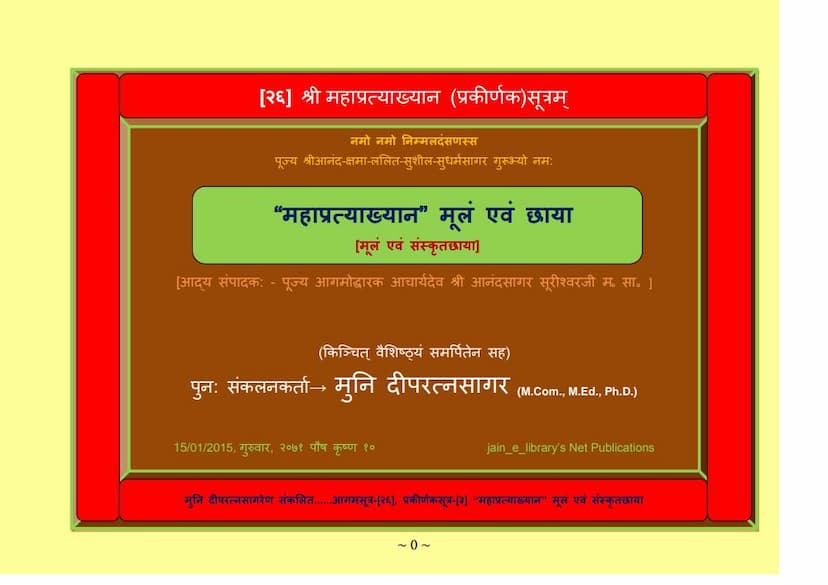Aagam 26 MAHA PRATYAKHYAN Moolam Evam Chaayaa
Added to library: September 1, 2025

Summary
This document is a digital publication of the Jain text "Maha Pratyakhyana Prakirnak Sutra" (Book 26), compiled and presented by Muni Diperatnasagar. The text is presented in its original Prakrit form ("Mul") and with a Sanskrit translation ("Chhaya").
Here's a breakdown of the content:
I. Introduction and Publisher Information:
- Title: Sri Maha Pratyakhyana (Prakirnak) Sutram.
- Author/Compiler: Muni Diperatnasagar (M.Com., M.Ed., Ph.D.).
- Original Editor: Pujya Aagamoddharak Acharyadev Shri Anandasagar Surishwarji Maharaj Saheb (Sagaranand Suriji).
- Publisher: Shri Aagamodaya Samiti (specifically, Jhaveri Venichand Sarachand).
- Publication Details: The original publication was in 1927 (Vikram Samvat 1983) by the Aagamodaya Samiti, edited by Acharya Anandasagar Surishwarji, and contained 10 Prakirnak Sutras.
- Muni Diperatnasagar's Rationale: The current digital publication is a re-compilation. Muni Diperatnasagar explains his motivation:
- To honor the faith and tradition of earlier works, especially the one edited by Acharya Sagaranand Suriji.
- To make this important scripture accessible to a wider audience through modern technology (jain_e_library.org).
- He details the improvements made in this edition:
- Preserving the original edited text in the middle of each page.
- Adding page numbers, chapter/sutra numbers for easy reference.
- Providing a "Deep Anukram" (Deep Index) for cross-referencing across various publications.
- Indicating whether a verse is a Sutra or a Gatha.
- Including a detailed index of studies and topics.
- Adding footnotes for corrections or clarifications.
- Digital Publication: This is presented as an "Internet Publication" by jain_e_library.org, with plans for future print publication.
II. Content of the Maha Pratyakhyana Prakirnak Sutra:
The Maha Pratyakhyana, as presented in this compilation, focuses on themes related to:
- Renunciation and Detachment (Vairagya): A significant portion of the text deals with the concept of renunciation of worldly attachments, possessions, body, and even actions driven by passion.
- Self-Reflection and Repentance: It emphasizes the importance of introspection, confessing past wrongdoings (ninda, garha, alochana), seeking forgiveness, and repenting for them.
- Mindfulness and Equanimity: The text advises on controlling the senses, mind, speech, and body, and maintaining a state of equanimity (samadhi).
- The Nature of the Soul: It highlights the eternal nature of the soul (atma) and its distinction from transient worldly possessions and relationships.
- The Cycle of Birth and Death: The text reflects on the endless cycle of rebirth and suffering caused by attachments and worldly desires, urging the reader to strive for liberation.
- Patience and Endurance (Pandita Maranam): A key theme is the aspiration for "Pandita Maranam" – a conscious, enlightened death – achieved through spiritual practice and detachment. It elaborates on enduring suffering in various forms of existence (hell, animals, humans, gods).
- The Path to Liberation: The text outlines the practices and virtues necessary for liberation, including:
- Adherence to the Three Jewels (Right Faith, Right Knowledge, Right Conduct).
- Practicing the Great Vows (Maha Vratas).
- Controlling the senses and desires.
- Living a life of righteousness and detachment.
- Seeking guidance from the enlightened (Jinas, Acharyas, Upadhyayas, Sadhus).
- Ethical Conduct: It stresses the importance of truthfulness, non-violence, non-stealing, and chastity.
- Spiritual Practices: The text mentions various practices like fasting (anasana), contemplation, and meditation.
III. Structure and Presentation:
The book is structured with the original Prakrit verses ("Mul") and their Sanskrit translations ("Chhaya") presented side-by-side or consecutively for each verse. The verses are numbered sequentially. The "Deep Anukram" on the left side of the page provides a running index.
Overall, the "Maha Pratyakhyana Prakirnak Sutra" is a profound Jain scripture that guides spiritual aspirants towards detachment, self-purification, and ultimately, liberation from the cycle of birth and death through ethical conduct and rigorous spiritual practice. This edition by Muni Diperatnasagar makes this valuable text accessible in a well-organized and informative manner.